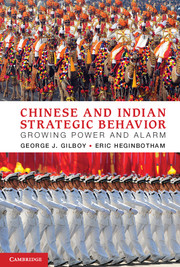Book contents
- Frontmatter
- Contents
- Figures
- Tables
- Acknowledgments
- Preface
- Abbreviations
- Map
- 1 Introduction
- 2 Strategic Culture
- 3 Foreign Policy, Use of Force, and Border Settlements
- 4 Military Modernization
- 5 Military Doctrine
- 6 Military Force Modernization and Power Projection
- 7 Economic Strategic Behavior
- 8 India, China, and Democratic Peace Theory
- 9 Meeting the Dual Challenge
- Appendix Defense Spending, Selected Additional Data
- Bibliography
- Index
- References
1 - Introduction
Published online by Cambridge University Press: 05 June 2012
- Frontmatter
- Contents
- Figures
- Tables
- Acknowledgments
- Preface
- Abbreviations
- Map
- 1 Introduction
- 2 Strategic Culture
- 3 Foreign Policy, Use of Force, and Border Settlements
- 4 Military Modernization
- 5 Military Doctrine
- 6 Military Force Modernization and Power Projection
- 7 Economic Strategic Behavior
- 8 India, China, and Democratic Peace Theory
- 9 Meeting the Dual Challenge
- Appendix Defense Spending, Selected Additional Data
- Bibliography
- Index
- References
Summary
Most recent studies of India and China put these quite different countries into a single category called “Asia’s rising giants,” followed by descriptions painted in broad-brush strokes. They have large populations – a source of some strength but also a source of terrible pressure on resources at home. Each is primarily a continental power, although each has long coastlines and substantial trade. Each has troubled borders, and each has one seemingly intractable territorial conflict that is bound up in its sense of national self-identify and its regime legitimacy – Taiwan for China and Kashmir for India. Each faces threats to domestic peace and internal stability, including poverty, inequality, and incomplete economic reforms, as well as ethnic, religious, and social conflict. Each has nuclear weapons and is modernizing its military capabilities. And, of course, each has launched a program of domestic reforms and integration with the global economy that has resulted in high rates of growth. This has put both on track to become economies that will – at least in absolute size – rival the U.S. economy within decades. Although they remain great power works-in-progress, Beijing and New Delhi may each harbor grand ambitions for what they will do with their growing power. Certainly, a shifting balance of power between states, such as the shift that appears to be occurring between the United States and the rising powers in Asia, has long been seen as an essential underlying cause of great power conflict.
The subtitle of this book, “Growing Power and Alarm,” echoes a passage in Thucydides’ The Peloponnesian War. Analyzing the causes of conflict between the great powers Athens and Sparta (Lacedaemon), Thucydides attributed the real cause of conflict to “the growth of the power of Athens, and the alarm that this inspired in Lacedaemon.” Yet Thucydides also highlighted difficulties a dominant state faces in accurately evaluating any challenge from rising powers. How does a dominant state judge the relative power balance – itself a complex mix of material, political, and moral capabilities? How does the international behavior of a rising state affect this judgment? In a world with multiple interests and threats, should the dominant state focus on a single potential challenger, or must it also beware potential challenges from other rising states?
- Type
- Chapter
- Information
- Chinese and Indian Strategic BehaviorGrowing Power and Alarm, pp. 1 - 24Publisher: Cambridge University PressPrint publication year: 2012



